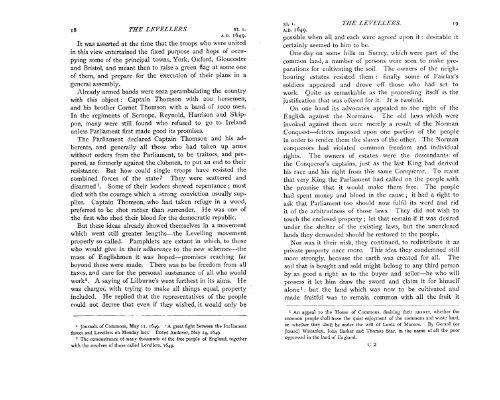HISTORY OF ENGLAND
HISTORY OF ENGLAND
HISTORY OF ENGLAND
- No tags were found...
Create successful ePaper yourself
Turn your PDF publications into a flip-book with our unique Google optimized e-Paper software.
THE LEVELLERS. XI. I.A.D. 1649.It was asserted at the time that the troops who were unitedin this view entertained the fixed purpose and hope of occupyingsome of the principal towns, York, Oxford, Gloucesterand Bristol, and meant then to raise a green flag at some oneof them, and prepare for the execution of their plans in ageneral assembly.Already armed bands were seen perambulating the countrywith this object : Captain Thomson with 200 horsemen,and his brother Cornet Thomson with a band of 1000 men.In the regiments of Scroope, Reynold, Harrison and Skippon,many were still found who refused to go to Irelandunless Parliament first made good its promises.The Parliament declared Captain Thomson and his adherents,and generally all those who had taken up armswithout orders from the Parliament, to be traitors, and prepared,as formerly against the clubmen, to put an end to theirresistance. But how could single troops have resisted thecombined forces of the state? They were scattered anddisarmed1. Some of their leaders showed repentance ; mostdied with the courage which a strong conviction usually supplies.Captain Thomson, who had taken refuge in a wood,preferred to be shot rather than surrender. He was one ofthe first who shed their blood for the democratic republic.But these ideas already showed themselves in a movementwhich went still greater lengths-the Levelling movementproperly so called. Pamphlets are extant in which, to thosewho would give in their adherence to the new schemes-themass of Englishmen it was hoped-promises reaching farbeyond these were made. There was to be freedom from alltaxes, and care for the personal sustenance of all who wouldwork2. A saying of Lilburne's went furthest in its aims. Hewas chargec with trying to make all things equal, property 'included. He replied that the representatives of the peoplecould not decree that even if they wished, it would only be1 Journals of Commons, May 11, 1649. 'A great fight between the Pa~liamentforces and Levellers on Monday last.' Dated Andover, May 14, 1649.2 The remonstrance of many thousands of the free people of England, togetherwith the resolves of those called Levellers, 1549.XI. I. THE LEVELLZRS. 19A.D. 1649.possible when all and each were agreed upon it: desirable itcertainly seemed to him to be.One day on some hills in Surrey, which were part of thecommon land, a number of persons were seen to make preparationsfor cultivating the soil. The owners of the neighbouringestates resisted them : finally some of Fairfax'ssoldiers appcared and drove off those who had set towork. Quite as remarkable as the proceeding itsclf is thejustification that was offered for it. It is twofold.On one hand its advocates appealed to the right of theEnglish against the Normans. The old laws which wereinvoked against them were merely a result of the NormanConquest-fetters imposed upon one portion of the peoplein order to render them the slaves of the other. The Normanconquerors had violated common freedom and individualrights. The owners of estates were the descendants ofthe Conqueror's captains, just as the last Icing had dcrivcdhis race and his right from this same Conqueror. To resistthat very King the Parliament had called on thc people withthe promise that it would make them free. The peoplehad spent money and blood in the cause; it had a right toask that Parliament too should now fulfil its word and ridit of the arbitrariness of those laws. They did not wish totouch the enclosed property; let that remain if it was desiredunder the shelter of the existing laws, but the unenclosedlands they demanded should be restored to the peoplc.Nor was it their wish, they continued, to redistribute it asprivate property once more. This idea they condemned stillmore strongly, because the carth was created for all. Thesoil that is bought and sold might belong to any third personby as good a right as to the buyer and seller-he who willpossess it let him draw the sword and claim it for himselfalone1: but the land which was now to be cultivated a'ndmade fruitful was to remain common with all the fruit it-' An appeal to the House of Commons, desiring their answer, whether thecommon people shall have the quiet enjoyment of the commons and waste land,or whether they shall be under the will of Lords of Manors. By Gerard (orJerard) Wistanley, John Barker and Thomas Star, in the name of all the pooroppressed in the land of England.C 2
















